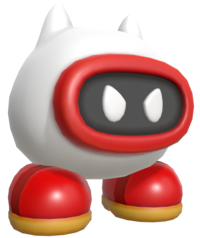Outmaway: Difference between revisions
Annalisa10 (talk | contribs) |
Annalisa10 (talk | contribs) |
||
| Line 16: | Line 16: | ||
|ChiR=Zúxiǎozǐ | |ChiR=Zúxiǎozǐ | ||
|ChiM=Foot Guy | |ChiM=Foot Guy | ||
|Dut=Outmaway | |||
|Ita=Scalciotto | |Ita=Scalciotto | ||
|ItaM=From "scalciare" (to kick) and the diminutive suffix "-otto" | |ItaM=From "scalciare" (to kick) and the diminutive suffix "-otto" | ||
Revision as of 17:49, November 3, 2023
This article is about a subject in an upcoming or recently released game. When the game is released, or more information about this subject is found, this article may need major rewriting.
This notice should be removed after a month has passed since the game was first released.
| Outmaway | |
|---|---|

| |
| First appearance | Super Mario Bros. Wonder (2023) |
Outmaways are enemies that appear in Super Mario Bros. Wonder. They are round white enemies with red-rimmed ski goggles and red shoes that kick Ice Blocks and Shells in their way. Some Outmaways walk back and forth, behaving like a Goombrat, while others are stationary. They appear prominently in a level with their own name, Outmaway Valley, as well as a Break Time! level called Kick It, Outmaway and A Final Uncharted Area: Poison Ruins.
Their attack pattern is reminiscent of Buster Beetle from Super Mario Bros. 3, as well as blue Beach Koopas from Super Mario World. Their name is a shortening of the phrase "out of my way".
Names in other languages
| Language | Name | Meaning | Notes |
|---|---|---|---|
| Japanese | ズンドコ[?] Zundoko |
A meaningless term used in the Japanese song「ズンドコ節」(Zundoko-bushi) | |
| Chinese | 足小子[?] Zúxiǎozǐ |
Foot Guy | |
| Dutch | Outmaway[?] | - | |
| German | Platzda[?] | From "Platz da!" (out of my way!) | |
| Italian | Scalciotto[?] | From "scalciare" (to kick) and the diminutive suffix "-otto" | |
| Korean | 뻥차[?] Ppeongcha |
From "뻥" (ppeong), which is possibly from a Korean reading of「ポン」(pon, onomatopoeia for striking), and "차다" (chada, to kick) | |
| Portuguese | Chutalino[?] | Contraction of "chuta ali" (kick it there), combined with the diminutive suffix "-ino" | |
| Russian | Кышек[?] Kyshek |
? | |
| Spanish | Patapatí[?] | Portmanteau of "patada" (kick) and "pa'ti", which is from "para ti" (for you) |